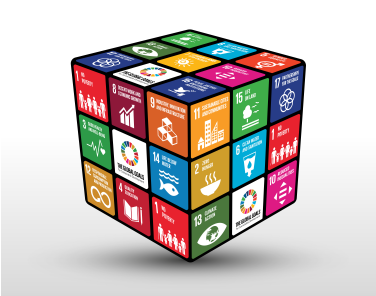About Policy Coherence
Why is Policy Coherence essential for the 2030 Agenda?

One of the key commitments of UN Member States under SDG Target 17.14 is to enhance Policy Coherence for Sustainable Development (PCSD). In essence, this means ensuring that different government policies are aligned with and supportive of each other to achieve sustainable development outcomes across its economic, social, and environmental dimensions.
This is a complex undertaking as it requires holistically tackling development challenges, developing mutually reinforcing policies across all relevant sectors to effectively achieve national sustainable development goals, and minimizing the negative impacts that policies in one area can have on another.
Many Voluntary National Reviews (VNRs) presented by Member States to the High-Level Political Forum (HLPF) noted that improving Policy Coherence was a complex issue.
It requires proper institutional arrangements that facilitate coordination and integration, quantitative and analytical skills to identify and assess synergies and trade-offs between different policy options, and reliable data for evidence-based policies.
UN DESA Support for Policy Coherence
UN DESA's support on policy analysis and Policy Coherence can help countries better understand their policies' multidimensional effects as a basis for developing more effective and efficient policy frameworks.
Tools for Policy Coherence
Modeling Tools and Methodologies
-
The World Economic Forecasting Model (WEFM) is a macro-econometric modeling tool to produce global economic forecasts for approximately 180 countries. Furthermore, the WEFM offers a framework for scenario analysis, allowing researchers to study the behavior of critical macroeconomic and development indicators (such as GDP, inflation, unemployment, current account, fiscal balance, and poverty rate) in different scenarios.
-
The open-source modeling tools are designed to help track the complex interactions of different aspects of sustainable development. Countries use these tools to advance social inclusion, tackle climate change, and achieve sustainable economic growth. Several tools are available, including:
- The Climate, Land-use, Energy, and Water Systems analysis and model (CLEWS) simultaneously considers food, energy, and water security.
- The Open Source Spatial Electrification Tool (OnSSET) aims to determine the most cost-effective conventional and renewable energy technologies for bringing electricity to specific localities. It is designed to identify means of providing access to safe, affordable, and reliable electricity to households that currently do not have it.
- Economy-wide and Microsimulation methodologies assess how different policy choices and external shocks may affect economic and social inclusion indicators.
Knowledge Platforms and Networks
-
The United Nations Economist Network (UNEN) - The UN Chief Economist coordinates the network open to all interested UN agencies, UN RCO economists, and UN country teams. As well as supporting UN resident coordinator offices and UN country teams to address economic, financial and social policy issues, the network intends to facilitate collaboration and joint work among its members on matters of common interest and relevance to the sustainable development agenda.
-
Technology Facility Mechanism (TFM) - The TFM aims to facilitate multi-stakeholder collaboration and partnerships by sharing information, experiences, best practices, and policy advice among Member States, civil society, the private sector, the scientific community, United Nations entities, and other stakeholders.
E-learning material
-
Integrated policies and policy coherence for SDGs is an interactive learning package jointly developed by UNITAR, UN DESA, and ECLAC. This set of comprehensive training materials aims to facilitate and enable government officials, academics, and UN Country Teams to run training workshops for government officials and other audiences on integrated policies, systemic approaches, and policy coherence for SDGs.
-
Economic and Social Impacts of COVID-19 eLearning Programme - Designed for government officials and other stakeholders, this online learning tool aims to increase participants' knowledge and understanding of the economic and social impacts of the COVID-19 pandemic.
Other Knowledge products
-
Global Sustainable Development Report (GSDR) is a report prepared by an Independent Group of Scientists coordinated by UN DESA, aimed at strengthening the interface between science and policy;
-
The UN Forum on Forests Flagship Report on the Progress Towards Global Forest Goals and Targets highlights the interlinkages between the Global Forest Goals and targets and SDG-forest-related goals and targets;
-
UN DESA Covid-19 policy briefs - This series features UN DESA's analysis and policy recommendations to recover better from the COVID-19 crisis and ensure a better and sustainable recovery.